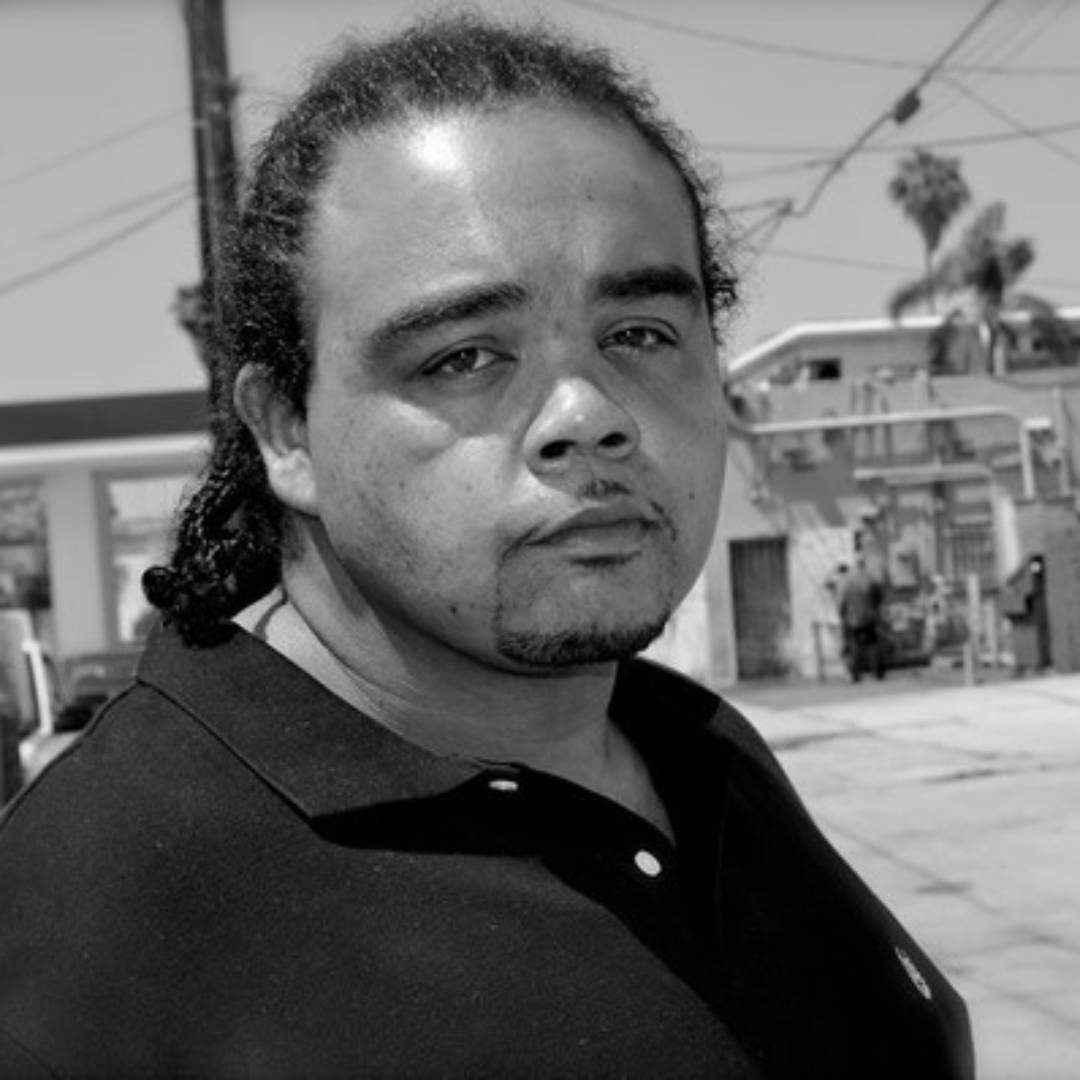Image via Big June/Discogs
J. Smith has visited Triggeration Station once or twice.
I met Big June in a Food 4 Less parking lot on a Saturday afternoon. It was the evening rush, cars pulling into stalls trying to avoid shopping carts and door dings – an organized scramble to get something for dinner, the kind that happens just before the sun sets. By any measure, an unassuming encounter on your way to the grocery store is pretty mundane. But to bump into the cat who released “Piru’N” before grabbing foodstuffs is surreal.
A mountain of a man, as his name implies, Big June is the kind of guy who gets stopped running errands or waiting in line at the Post Office. And that’s exactly what this was, where after a quick introduction from a friend in common, we chopped it up before he had to go. He’s a “Piruneer” (pioneer and Piru combined), a handle he’s given himself — one that articulates the contributions he’s made to San Diego’s gangster rap tradition. And prior to him leaving we agreed to a conversation at some point in the future – a proper interview to talk about his history, career and music.
His debut was the 1992 maxi-single, “Straight Jackin.” Over 808 hits, a neck-nodding bassline, panned adlibs and reverb-soaked vocals, he guided listeners through parts of the city only the tapped-in knew about. These are the places beyond tourist traps like Seaport Village or even Presidio Park. June tells stories of the Southeast corridor, a space absent surfers and Shamu, the inner ring bounded by freeways and hood politics. He offers his take on the G-tales genre, informed by local landmarks and regional idioms— where St. Louis baseball caps allude to turf ties, Morse High School is name checked and weed is rebranded as the “dunker dunk.”
It’s a cassette time capsule featuring him on the cover, rocking Dickies and a shoulder length perm. The butt of a pistol sticks out from his right side front pocket. He was 16 years old when it dropped, a sophomore splitting time outside of class between studio sessions and hanging with the homies. “I was at Steve’s house,” June says, explaining how it came together. “He gave me a beat, ya know. He made me a little beat and I made the song.” Studio magic, no doubt. And when you consider that the “Steve” he’s referring to is VMF, the artist/producer who MC Hammer featured on his 1995 single “Sultry Funk,” it feels like a precursor foreshadowing success they would both find later on.
Indeed, the early nineties scene in San Diego was self-contained. Insular but active, a community that had names like Gangsta Ern, The Green Eyes, and Big June circulating via word of mouth praise, hustle and independent tapes. Nothing but a gangsta party, blues over beats, the streets of Southeast were just like Compton and at the time San Diego’s niche rap reflected exactly that.
June’s music was well received and he started traveling out of town to network with industry insiders. There were trips to the Bay, Arizona and Los Angeles where he rubbed elbows with OG’s like Snoop Dogg and DJ Quik. He even had a deal from Eazy E’s Ruthless Records on deck. However, addiction (PCP), youth and inexperience caused him to lose focus—the offer fell through. Landing back on the block, at 21, Big June got locked up.
In 2002, after being released from prison, June got his rap chops back in order. There was “My Day Goez On” in 2003 and “Flamed Up” in 2006. However, it was his 2008 single, a kind of sing-along for the set, “Piru’N,” that re-established his hood legend bonafides. It hit like theme music for the affiliate – full of hubris, slow funk, and menace. The original video has about a million views on Youtube and the remix almost twice that. It heralded a victory for him and a good look for the hometown; San Diego was putting numbers on the board.
But just as momentum was building, he got locked up again. This second bid was for four-and-a-half years. Behind bars, there was little he could do to capitalize on the success of “Piru’N,” and the moment felt bitter sweet.
In 2014, he returned home to start the rebuilding process. Almost a decade later, he’s gotten sober and become a family man. He’s matured and most importantly, he’s survived. Our conversation started out in that parking lot, but it picked up over the phone across a couple of weeks. During our calls Big June shared highlights and heartbreak with a disarming calm. He’s neither jaded nor prickly, and is somehow far from bitter.
When you speak to him, you immediately notice his humility, quiet charisma, and charm. In San Diego, he is a legendary O.G., but down to earth, who you might just see milling about the bread aisle, if you’ve been paying attention.

